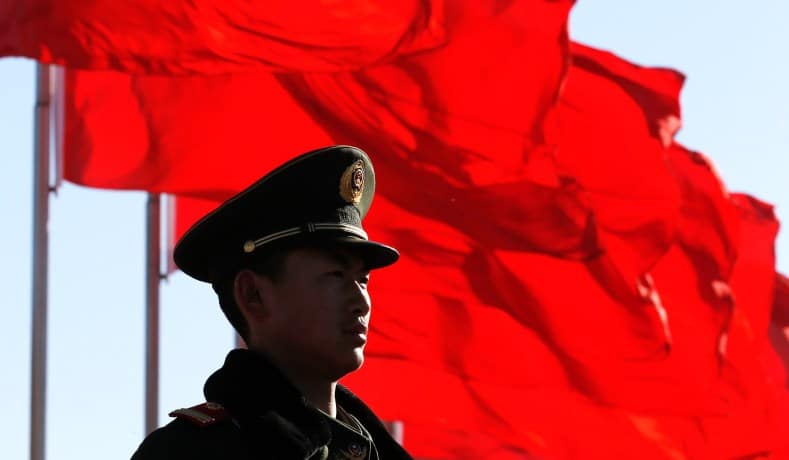After 70 Years, Communist China Is Weaker Than It Appears
The Communist ideology is a parasite that cannot survive for long on its own.

The Soviet Union collapsed in 1991 after 69 years of tyranny and aggression. On October 1, the People’s Republic of China will officially turn 70. The brutal regime of Mao Zedong and Xi Jinping has made China the world’s longest surviving Communist country, and unlike the Kremlin of old, Beijing seems stronger than ever.
The contrast between China today and the Soviet Union at its death could hardly be more stark. In the early 1990s, Russia’s military was swiftly losing ground to American investment and innovation, forcing a global retreat of influence and power. Today, the People’s Liberation Army is quickly closing the gap with the U.S. armed forces and is projecting its newfound power from the Arctic to Africa to Australasia.
Communist China is also sprinting economically. It overtook Japan as the world’s second-largest economy in 2011, and its GDP has nearly tripled since then. Many forecasters say it’s a matter of when, not if, China overtakes the U.S. By comparison, the Soviet Union struggled to keep its economy even half as large as America’s.
Finally, China is markedly more oppressive than the Soviet Union at a similar age. Where the latter was weakening its control over people through perestroika and glasnost, the former has imprisoned millions of Muslim Uighurs, initiated a new crackdown on Christian worshipers, and instituted a draconian social-credit system that monitors the Chinese people’s daily lives and ranks them accordingly. It even seems willing to initiate a Tiananmen Square–style crackdown on the escalating protest movement in Hong Kong.
Has Communist China discovered a fountain of youth? Yes, and it’s exactly where Ponce de Leon said it would be: in America.
Whereas the Soviet Union largely walled itself off from its greatest adversary, literally and figuratively, China’s leaders have sought to exploit America across the board for decades. China profits from U.S. financial markets; purchases cutting-edge U.S. firms; pilfers trade secrets and technology from U.S. companies, including defense contractors; and promotes a massive misinformation campaign on U.S. soil to sway policy and public opinion in its favor. Yet far from being a source of strength, Communist China’s dependence on America is one of its primary weakness.
Like the Soviet Union before it, China’s tyranny stifles the creativity of its people. While Beijing grants some few a small amount of economic autonomy, it refuses to let the average Chinese citizen fully pursue her dreams, apply her talents, or realize her potential, preventing untold advances across every field of endeavor. There’s a reason Chinese parents send their children to American universities and their cash to Western banks. China’s seemingly inexorable rise requires continued access to America and the fruits of our system of free enterprise and the rule of law.
This reality is coming into focus under President Trump. The administration has started to disentangle Communist China from America’s economy and institutions. China’s stock markets are suffering and its economy is growing at the slowest rate in nearly three decades. Additional unraveling of U.S.–China ties will likely further demonstrate the bankruptcy of the Communist economic model, and its need for external support.
Beijing knows this, hence its relentless focus on tamping down trade tensions, but not national security or human-rights issues. It also benefits from the widespread belief that Communist China is here to stay, so we might as well deal with it rather than hope for a better, more democratic regime. In our organization’s discussions with government leaders, prominent academics, and corporations, we have found an overwhelming belief that a change in China’s government would be catastrophic. They prefer to work with the devil they know, not hope for a devil they don’t.
Yet the lessons of history are worth remembering. The fall of the Soviet Union ushered in a new era of freedom, prosperity, and peace in its former lands, and far beyond. A collapse of red rule in China will surely be more complicated, given its greater interaction with the world, but it stands to reason that the Communist party’s loss will be the Chinese people’s gain. Many others, America included, will benefit, too.
Communist China is weaker than it appears. However, it’s unlikely to fall unless the United States, and the rest of the free world, continue to ratchet up the pressure. The Communist ideology is a parasite that cannot survive for long on its own. This 70th anniversary is a time to realize that Communist China should never have gotten this far.
Marion Smith is the executive director of the Victims of Communism Memorial Foundation, an educational and human-rights non-profit authorized by a unanimous act of Congress. @smithmarion

